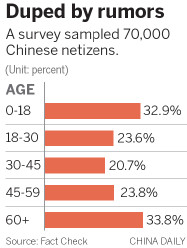
The majority of fake stories shared on the Chinese internet involve food safety or give health advice, an online information verification team set up by tech giant Tencent said on Wednesday.
Fact Check, a platform that analyzes online rumors, released a list of the top 10 online rumors that duped Chinese netizens since April last year. Eight related to people's health-especially the safety of food and medicine.
In February, for example, a video that included claims that seaweed containing plastic was being sold in China made the rounds on the internet.
The video was quickly proved false by the Center for Food Safety Risk Assessment in Beijing, according to the platform, yet it still resulted in a nearly 100 million yuan loss ($14.7 million) to the seaweed industry in Fujian province.
"Netizens are easily attracted by health information online and like to forward it to friends or family members," said Wang Yang, an employee responsible for the platform at Tencent, the company behind WeChat.
Wang's team tabulated more than 2,000 pieces of false information from 2.2 million WeChat users this year, finding that around 45 percent related to health and 16 percent to food safety.
"Many netizens who forwarded such fake health information are over 60 years old and not well-educated," she said.
Another survey of 70,000 netizens by the team echoed those results.
The platform listed 10 popular but false online rumors over the past year, finding that people over 60 years old had the highest chance of being tricked-as high as 33.8 percent.
"To prevent older netizens from being duped by fake information, we started to cooperate with food and medicine administrations this year, hoping to post authorized responses and verify the information in a timely manner," Wang said.
Kou Fei, 29, an employee of a Beijing educational institute, said her parents often send or forward health-related information, "but sometimes I cannot distinguish fake ones, as I don't have much scientific knowledge".
Beijing's cybersecurity authority said it has created a system, with several internet companies, to identify fake information online using key words to clean rumors in a timely manner.


















































